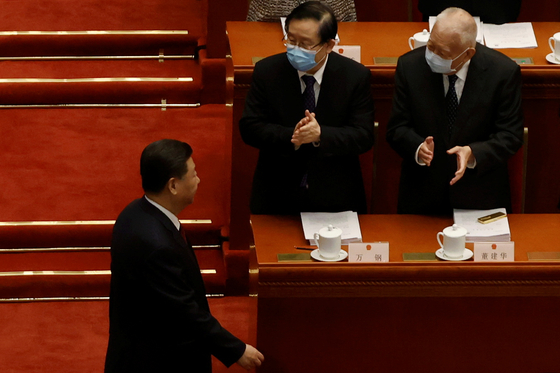![Former Hong Kong Executive Minister Dong Jian-hua (right) stands up and applauds Chinese President Xi Jinping (left) as Chinese President Xi Jinping (left) enters the opening ceremony of the NPC held at the Beijing People's Congress on the morning of the 5th. [연합뉴스=로이터]](https://i0.wp.com/pds.joins.com/news/component/htmlphoto_mmdata/202103/05/be15abb0-f43c-4d5b-be2b-78a43ec37d93.jpg?w=560&ssl=1)
Former Hong Kong Executive Minister Dong Jian-hua (right) stands up and applauds Chinese President Xi Jinping (left) as Chinese President Xi Jinping (left) enters the opening ceremony of the NPC held at the Beijing People’s Congress on the morning of the 5th. [연합뉴스=로이터]
Chinese Prime Minister Li Keqiang (李克强) proposed this year’s economic growth target to be ‘6% or more’ on the 5th. Although it is at a lower level than the market expected, an analysis says that it showed confidence compared to last year, when the target was not set at all due to the shock of the Corona 19 outbreak.
Lower than the market forecast… Lower the fiscal deficit rate
Raising the threshold of candidates by advocating’patriot rule’
Legislative Assembly/Administrative Ministers’ Election Committee Seats Will Increase
Prime Minister Lee announced this in the report on the work of the National People’s Congress (Non-in University) held at the People’s Congress of Beijing this morning. He said, “The reason we set the forecast for the economic growth rate of more than 6% this year is because it is a favorable environment for promoting reform, innovation and qualitative growth in each field, taking into account the economic recovery situation.”
Major institutions’ forecasts for China’s economic growth this year are 8~9%, including the World Bank’s 7.9%, the International Monetary Organization (IMF) 8.1%, and Nomura Securities 9%, higher than Prime Minister Lee’s stated target. In addition to anticipation of an economic recovery, the’base effect’ that last year’s growth rate fell to 2.3% due to the corona shock was taken into account. In this situation, suggesting ‘6% or more’ is read as a means of pursuing qualitative growth rather than quantitative growth amid concerns over an asset bubble and a surge in debt. In addition, it seems that the strategy to change the export-only economy into a’twin cycle’ structure accompanied by domestic demand is reflected in the US checks.
Prime Minister Lee also suggested target values such as 11 million new employees, 3% inflation rate, and 3.2% fiscal deficit rate in the work report read aloud for an hour. The fiscal deficit rate fell sharply from 3.6% last year. In particular, it announced that it would not issue special government bonds for quarantine, which was issued at a scale of 1 trillion yuan last year, foreshadowing the transition to austerity mode.
This year’s defense budget, which attracted attention, has been organized at 1.355.3 trillion yuan (about 236 trillion won), an increase of 6.8% from last year. This is 0.2 percentage points higher than last year’s growth rate of 6.6%. The growth rate of China’s defense spending was 8.2% in 2018 → 7.5% in 2019 → 6.6% in 2020, a trend that had declined for the third consecutive year.
![Prior to the opening ceremony of the NPC held at the Beijing People's Congress on the morning of the 5th, China's Foreign Minister Wang Yi (right) is passing by Carrie Ram (left), Hong Kong's administrative minister. [연합=로이터]](https://i0.wp.com/pds.joins.com/news/component/htmlphoto_mmdata/202103/05/8c238fe6-e8b5-404a-818d-24731c02aceb.jpg?w=560&ssl=1)
Prior to the opening ceremony of the NPC held at the Beijing People’s Congress on the morning of the 5th, China’s Foreign Minister Wang Yi (right) is passing by Carrie Ram (left), Hong Kong’s administrative minister. [연합=로이터]
Hong Kong legislative elections likely to postpone another year
The topic of the opening ceremony of the NPC this year was Hong Kong, following last year. Prime Minister Lee said on the day that “one country and two systems (one country and two systems)”, “Hang-inch Port”, and high-level autonomy policies must be accurately implemented. However, he also mentioned the principle of’patriot rule’, which President Xi Jinping mentioned, saying, “We must firmly prevent external forces from engaging in Hong Kong.”
Subsequently, Vice Chairman Wang Chun (王晨) of the NPC insisted on the necessity of reorganizing the Hong Kong election system. “The obvious loopholes and flaws in Hong Kong’s current electoral system gave anti-Jung Lanhang (opposing China and disturbing Hong Kong) a chance to seize control of Hong Kong,” said Vice Chairman Wang. He said, “Comrade Deng Xiaoping in June 1984 clearly pointed out that Hong Kong, whose patriot is the main body, should rule Hong Kong.” “The standard of patriots is to respect their own people, defend their country with sincerity, and promote the prosperity and stability of Hong Kong. It does not cause any damage,” he said. Vice-Chairman Wang requested the deliberation of a draft decision during the NPC session this year, which included amendments to Annex 1 of the Hong Kong Basic Law and Annex 2 of the Legislative Assembly, which contained the method of electing the Hong Kong Executive Minister.
The outline of the reorganization of the Hong Kong election system is also being revealed. On the night of the 4th, Shabaorong, head of the Hong Kong and Macau Pan Office, met with a Hong Kong political council member in Beijing to increase the number of legislative members from 70 to 90, and the number of electoral committees, which are the chief executive officers, from 1200 to 1500 The Hong Kong Seongdo Daily reported on the 5th that it explained the reorganization plan. It also included content that the democratic power of Gu was deprived of the executive minister’s election committee qualifications, and the conditions for the executive minister’s candidacy were raised from the previous election committee recommendation to 188 members. The legislative election, which was postponed for one year from September last year to September this year, is expected to be postponed again by one year as the Chinese authorities said they would correct the election system.
Beijing = correspondent Shin Kyungjin [email protected]
![]()
